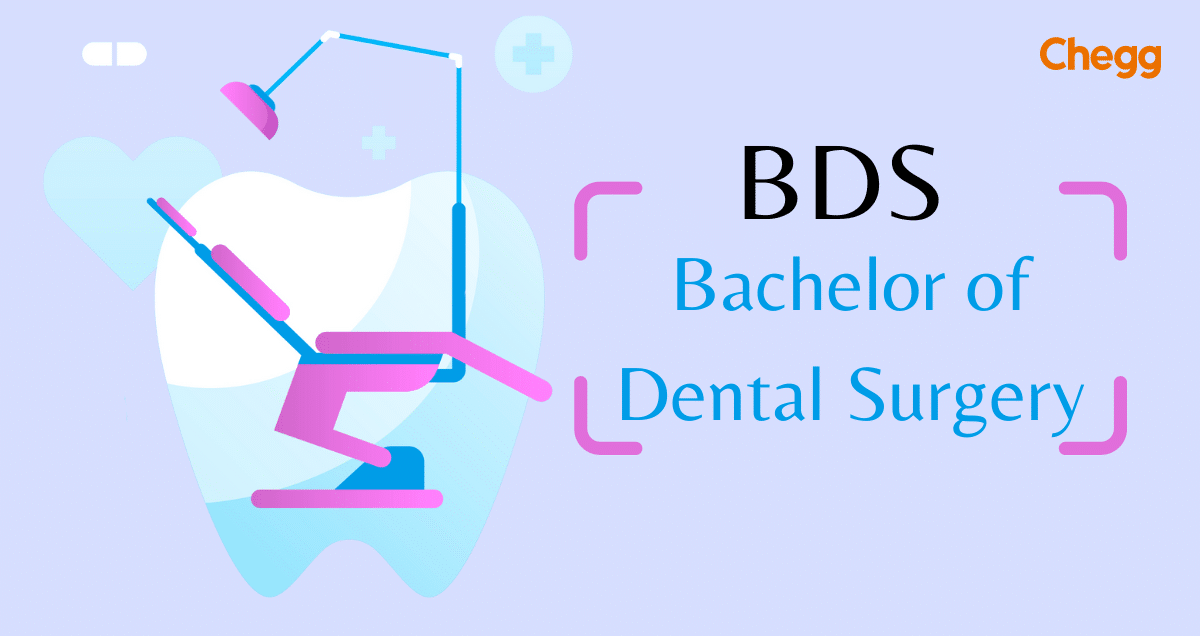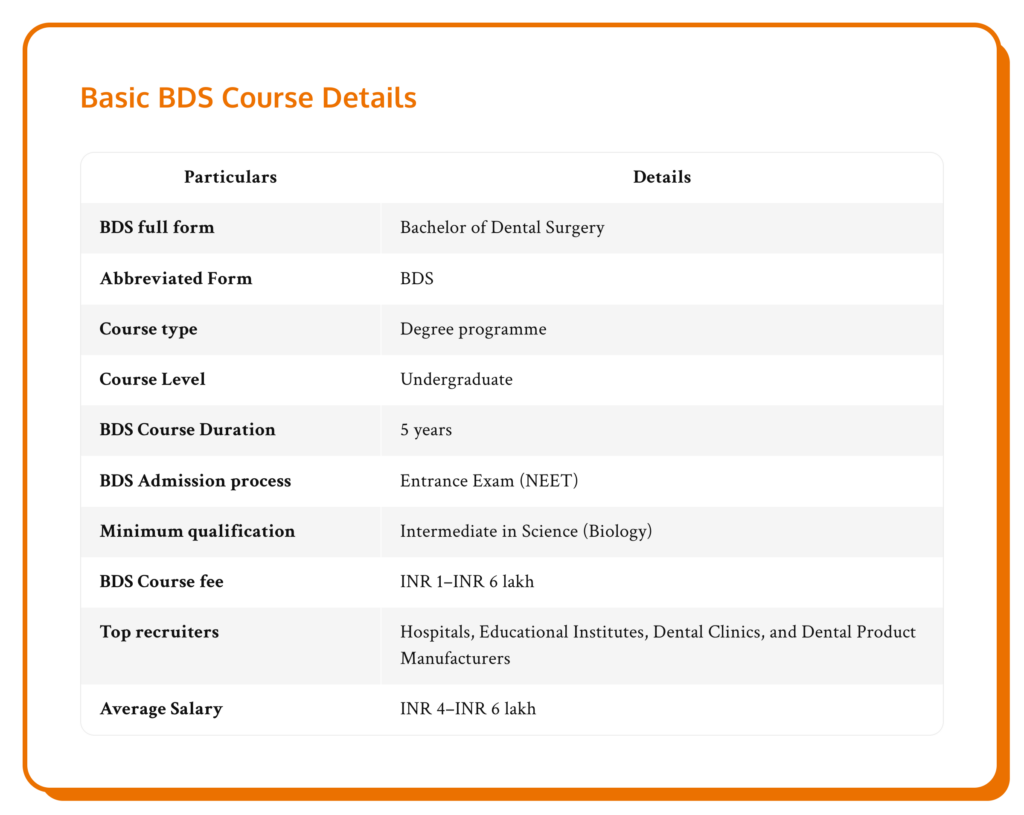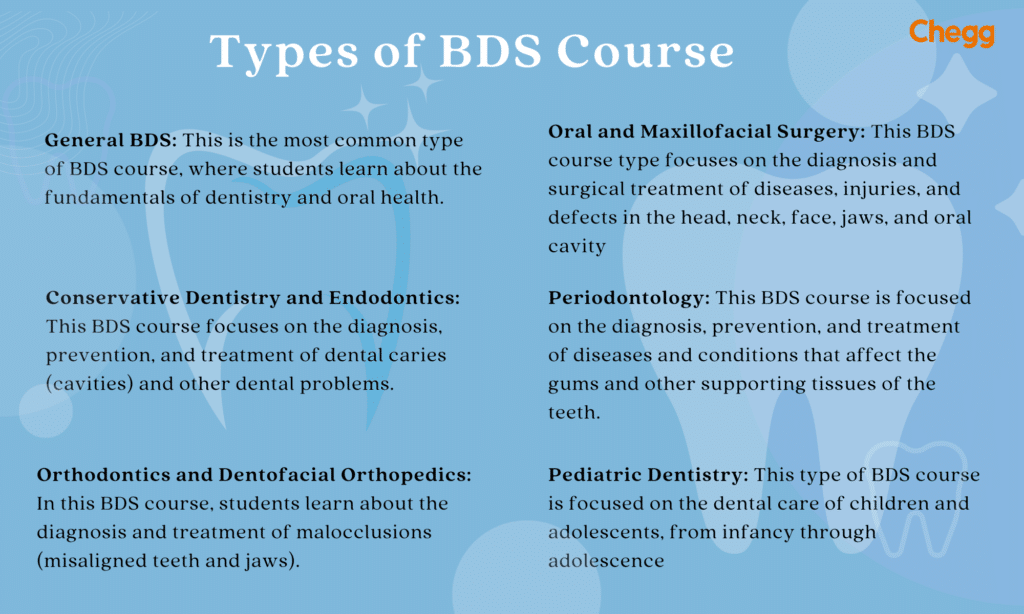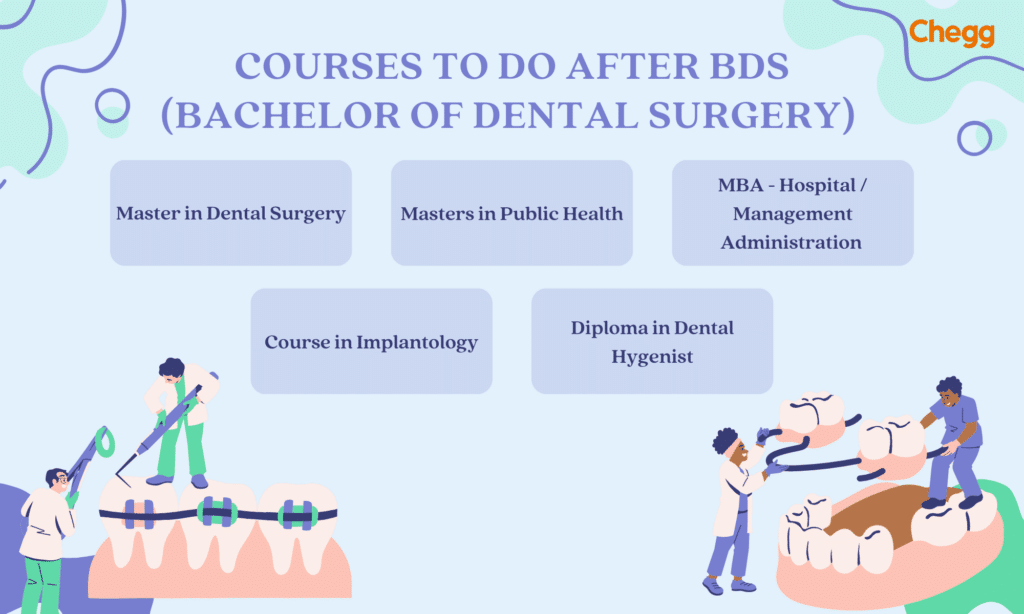
Got a question on this topic?

Quick Summary
The BDS course lasts five years, including a one-year internship. Admission requires passing entrance exams and meeting specific eligibility criteria.

Authored by, Amay Mathur | Senior Editor




Amay Mathur is a business news reporter at Chegg.com. He previously worked for PCMag, Business Insider, The Messenger, and ZDNET as a reporter and copyeditor. His areas of coverage encompass tech, business, strategy, finance, and even space. He is a Columbia University graduate.
If you are here and are reading this article on the BDS course, it’s most probably because you are considering choosing dentistry as your career or have already decided to choose it and want to know more about the BDS course details. Whichever is the case, you will get all the information about the course here.
BDS is India’s most popular course for pursuing dental medicine and surgery. BDS full form is a bachelor’s in dental surgery, a comprehensive degree program. It offers career prospects in the healthcare and pharmaceutical sectors and many other top-notch career opportunities.
Let’s take a look at all the BDS course highlights:


The Bachelor of Dental Surgery (BDS) program in India is a comprehensive 5-year course. Here’s how the timeline is structured:
Years 1-4: These initial years focus on theoretical knowledge and practical training in dental sciences. The curriculum includes essential subjects like Dental Anatomy, Oral Pathology, Prosthodontics, and Orthodontics.
Year 5: The final year consists of a compulsory rotating internship. During this time, students acquire practical experience across various dental specialties, such as Oral Surgery, Periodontics, and Pediatric Dentistry.
This framework guarantees students a well-rounded education, blending academic learning with hands-on skills.
There is only one way to get admission to a BDS course: to clear the NEET exam. Based on the marks obtained in NEET, students can be admitted to their preferred college or university. But before you get admission, you need to follow the process.
Related Read:
Comprehensive Guide to Entrance Exams after Graduation
Boost Your Career Prospects with These In-Demand Courses After Graduation

Different subjects are taught during the BDS course to teach students the theoretical part and give them knowledge of the human body and its relation to dentistry. Although the sequence or the name of the subject can differ depending on the university or college, the content remains the same.

Here is a list of the top colleges offering the BDS Course, the approximate BDS course fees are also listed. The below list of colleges has been extracted from Dental Council of India.
|
Colleges |
Estimated Fees |
Faculty of Dental Sciences, IMS BHU, Varanasi |
INR 1 lakh |
Maulana Azad Institute of Medical Sciences, New Delhi. Fees |
INR 1 lakh–1.5 lakh |
Faculty of Dental Sciences King George’s Medical University, Lucknow |
INR 1.5 lakh–INR 2 lakh |
Government Dental College and Hospital, Mumbai |
INR 2 lakh–INR 2.5 lakh |
Dr R Ahmed Dental College and Hospital, Kolkata |
INR 1 lakh |
Manipal College of Dental Sciences, Mangalore |
INR 25 lakh–INR 30 lakh |

Dental clinics and hospitals hire BDS graduates because BDS graduates understand dentistry-related issues optimally. Earning a Master’s in Dental Surgery (MDS) allows one to become a lecturer.
Various career options for BDS graduates and BDS salaries are listed below.
|
Jobs |
Average Salary (in INR) |
|
Dental Surgeon |
3 LPA |
|
Dental Assistant |
1.2 LPA |
|
Oral Pathologist |
5.7 LPA |
|
Dental Hygienist |
2.2 LPA |
|
Dental Scientist |
3 LPA |
Source: Ambition Box
Dental surgeons are highly trained professionals focusing on the medical sciences. They perform various operations, from simple routine cleaning to complex cosmetic and corrective surgery. Oral surgeons must complete their training before they can work independently.
To become a dental surgeon after doing a BDS course, you must also pass tough exams and evaluations to prove you have the skills to do your job successfully.
Dental assistants are young BDS graduates who work to provide additional help to surgeons by scheduling appointments and allowing patients to be treated swiftly. They also sterilize, disinfect, and arrange dental tools, help with dental procedures, and maintain patient records.
As a dental assistant, you will be in charge of regular administrative and upkeep duties at the clinic. You will also perform lab work as instructed by the dentist. Your primary task is to prepare patient rooms for visits and ensure the dentist can access all necessary equipment.
An oral pathologist manages teeth, gums, jaw, mouth, neck, and head illnesses. They also recommend surgical treatments for issues found during examinations, including removing tumors or tumor cells. They examine medical records to identify patients’ risk factors for particular cancers or diseases. They frequently collaborate with dentists to find and address problems with oral health. They may also be involved in research on oral pathology or dental medicine.
Another path to choose after completing your BDS course is becoming a dental hygienist. Dental hygienists are licensed oral health professionals who work alongside dentists to help patients maintain good oral hygiene and prevent dental problems. They are experts in performing routine dental cleanings, taking X-rays, applying fluoride treatments, and educating patients on proper dental care practices.
As a dental hygienist, you may assist dentists in more complex procedures, such as filling cavities or applying sealants. Dental hygienists play a crucial role in preventing tooth decay, gum disease, and other oral health issues by promoting good dental hygiene habits and providing preventive care to patients.
If you are curious about the importance of oral hygiene and its role in human life, you should consider becoming a dental scientist after completing your BDS course. Dental scientists specialize in the study and research of oral health. They conduct experiments and clinical trials to discover new techniques and treatments for dental problems. Dental scientists may also work to improve existing dental procedures, materials, and technologies.
As a scientist, you get to collaborate with other healthcare professionals, such as dentists and dental hygienists, to develop effective solutions for dental patients. Your work can help advance dentistry and improve the overall oral health of the population. Dental scientists require extensive education and training in both scientific and dental principles to excel in their field.
Also Read About:
BSc Anesthesia – Course Details and Jobs
Dentists and oral hygiene are some of the most reputed careers and important aspects of everyone’s life. If you want to make a career in this field of medicine, then the BDS course is your path. This five-year course teaches and trains you in every way a practitioner BDS graduate needs to be.

The Bachelor of Dental Surgery (BDS) program is an in-depth curriculum aimed at providing students with the essential knowledge and skills for a thriving career in dentistry. It encompasses a range of subjects, including dental anatomy, oral pathology, and orthodontics, blending theoretical education with hands-on training. Graduates emerge ready to diagnose and address dental problems, conduct surgeries, and advocate for oral health. With a significant focus on clinical practice, the BDS program equips students to effectively tackle the challenges of the dental field and make meaningful contributions to public health.

Like any other medical course, BDS admission is only possible for students who attempt and pass the NEET entrance exam with qualifying marks. So, yes, it is right to say that BDS candidates require the NEET exam to get admission to any college or university.
It depends on the learner what they want to become in order to decide which course is better. Both BDS and MBBS are medical courses; however, BDS specializes in dentistry, whereas MBBS teaches students to become doctors. Both courses are good in their own respect.
No, BDS or Bachelor of Dental Surgery is a five-year comprehensive course. In which 4 years, students are taught theoretical aspects of medicine and dentistry. The fifth and final year is the internship perio,d during which they get hands-on training experience in various surgeries and dental procedures.
Yes, the BDS course is one of the most sought-after courses for students who want to make a career in the field of medicine or, more specifically, in dentistry. It’s an undergraduate course, and one can choose to do it after completing their 10+2 education.
The course fee for the BDS course duration can differ from institute to institute. However, the estimated course fee for the course ranges between INR 1 lakh to 30 lakhs for private institutes. And these fees can go down if you are admitted to a government college.
Editor's Recommendations
Chegg India does not ask for money to offer any opportunity with the company. We request you to be vigilant before sharing your personal and financial information with any third party. Beware of fraudulent activities claiming affiliation with our company and promising monetary rewards or benefits. Chegg India shall not be responsible for any losses resulting from such activities.
Chegg India does not ask for money to offer any opportunity with the company. We request you to be vigilant before sharing your personal and financial information with any third party. Beware of fraudulent activities claiming affiliation with our company and promising monetary rewards or benefits. Chegg India shall not be responsible for any losses resulting from such activities.